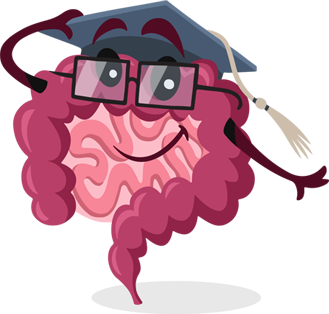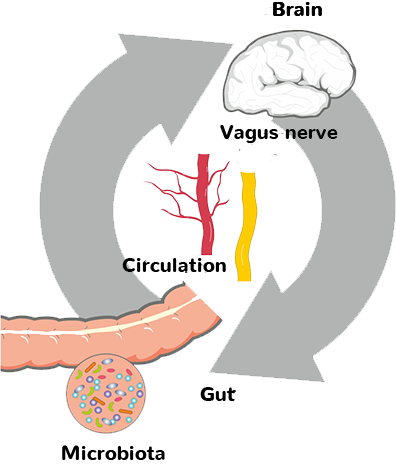Large intestine

Microbes - our secret protectors
The largest community of microbes lives in our digestive system, especially in the large intestine. Each person's gut microbiome contains approximately 400 - 1500 different types of microbes and over 3 million genes.If all the microbes and their genes from our gut were collected and put on a scale, they would weigh about 1.5 - 2 kg. One-third of these microbes are common for most people, while two-thirds are unique for each of us, just like our fingerprints.
Each microbe has a task, so the diversity of microbes is important for our health. The gut microbiome (source - author: youtube.com - The Conversation) is a "new organ" that needs to be nurtured to maintain our health.

Each person has several hundred types of bacteria within their microbiome.


Are bacteria responsible for obesity?
There are two prominent groups among many anaerobic bacteria in the gut microbiome: Gram-positive, Firmicutes and Gram-negative Bacteroidetes. These two groups need to be in balance because if the ratio (F/B ratio) is disturbed, obesity and other diseases will occur. Most studies have shown that Firmicutes are associated with obesity, and if you want to be slim, you need more Bacteroidetes in your gut.


How many brains do you have? One?
It is less known that our digestive system has its own "second brain" called the intestinal nervous system. It consists of more than 100 million nerve cells, which, just like in the real brain in the head, send and receive impulses, record experiences and respond to emotions. The gut microbiome can upset the brain, just as the brain can upset the digestive system.
The intestinal nervous system or "second brain" is created from the same tissue as the real brain and is influenced by the same substances that transmit impulses between the nerves in the brain. The intestinal nervous system is essential for organizing intestinal activity, controlling their motility, blood flow, acting on hormone-secreting cells, affecting the repair of the intestinal epithelium, etc.
View more on video.
Source - author: youtube.com - AsapSCIENCE

Gut-brain axis


Our two brains are constantly cooperating with each other. Their connection is called the gut-brain axis. The "conversation" between the real and the "second" brain influences how we feel and affects the quality of our lives. The intestinal nervous system notifies the brain when we're full or causes nausea if we overeat.
The gut-brain axis is two-way communication between the brain and the digestive system, that is, the gut microbiome directly through the vagus, but also through various chemical messengers - neurotransmitters.



9 times more messages go from the digestive system to the brain than from the brain to the digestive system.
Let's brainstorm with our belly!

Have you ever felt "butterflies" in your stomach when you had a crush on someone or out of fear "squeezed" your stomach? How does the gut-brain axis, i.e. the gut microbiome, affect memory, feelings, social behavior and mental health, such as depression?
Bacteria from the gut microbiome produce neurotransmitters, chemicals like dopamine and serotonin that allow communication between neurons in the brain and the intestinal nervous system. These neurotransmitters affect our gut function as well as our mood and behavior. It is now clearer how the health of our digestive system affects our mood. If dysbiosis and serotonin deficiency happen, they can lead to bad mood and depression. Serotonin is also needed to create melatonin - a sleep hormone. If it is in imbalance, we sleep worse and we feel tired in the morning. That is why control and balance in the gut microbiome can help improve the symptoms of mental disorders.
Dopamine
Is also called "feel-good hormone" because it is secreted after meeting a certain goal. It transmits signals of pleasure and excitement.
Serotonin
It is a "happiness hormone" that is mainly (90%) produced in the gut. It increases confidence and reduces uncertainty.
Melatonin
It is a "sleep hormone" or "hormone of darkness". It regulates our biological clock and sleep.
90% of the happiness hormone is produced in the gut. We can briefly increase the amount of serotonin by consuming dark chocolate.






